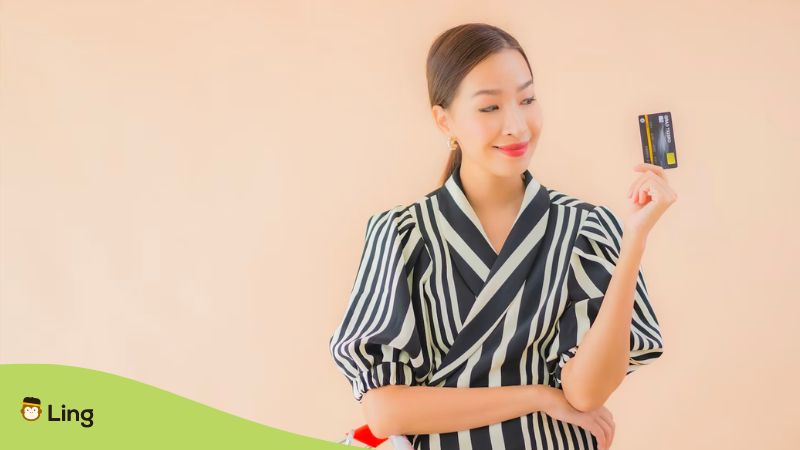Shopping in China is a whole new ballgame. Sure, you can make the whole “point at the thing you want and hope they understand” thing—but that’s not very effective. You might end up buying a whole bunch of stuff you don’t really need, or worse yet, end up with nothing at all.
When you’re going to a new city and don’t know how to speak the language, shopping can be a challenge. But don’t worry! There are plenty of ways to get around this problem.
You just need the essential words to say. That’s why we’ve put together this list of 10 shopping vocabulary in Chinese that every shopper should know:
Shopping Vocabulary In Chinese
1. 买东西 (Mǎi Dōngxi)
买 (mǎi) implies “to buy,” while the word 东西 (dōngxi) means “thing(s), or stuff.” When you put these terms together, 买东西 (mǎi dōngxi) can be translated to “to buy things.”
It seems to be the easiest way to express “go shopping,” which is the most shopping-related word that Chinese learners encounter. This phrase is simple for newbies to memorize since it comprises two fundamental Chinese terms.
Example:
I want to buy something – 我要买东西 (wǒ yāomǎi dōngxī)

2. 百货公司 (Bǎi Huò Gōng Sī )
The term 百货公司 corresponds to a “department store.” Each word’s connotation is broken down as follows: 货 is “goods” or “things,” 百 means “one hundred” or “a lot,” and 公司 is a “business organization.”
When you combine these Chinese words, you get a department store or a location where many different kinds of goods are offered. Another phrase for this is 百货商店 (băi huò shāng diàn).
If you want to know where the shopping mall is, say 商场 (shāng chǎng) or 超级市场 (chāo jí shì chǎng), which means “supermarket” or 夜市 (yè shì) which means “night market.”
Example:
Can you show me the way to the department store? (能告诉我去百货公司的路吗?) – néng gào sù wǒ qù bǎi huò gōng sī de lù má ?
3. 打折 (Dǎ zhé)
Depending on how you phrase them in your inquiries, 打折 (dă zhé) might signify either discount or a sale. When products are on sale, there are several signs indicating this.
Sometimes shopping centers may use “打 折” (dă zhé) to show how the product is discounted, where the blank will contain a number value.
In English, we mostly see signs that read “10% discount” or “25% off.” In Chinese written language, the discount figure printed on the sign indicates the percentage of the current price relative to the original cost.
For example, 打九折 (or 打9折) denotes that the actual discounted price is 90% of the original cost, not a discount from the original price. Similarly, if you see 打七折 (or 打7折), it signifies that the current discounted price is 70% of the actual cost.

4. 号 (Hào)
号 is seldom used alone. Typically, a size-related descriptor comes before this. In Chinese vocabulary, you can use 大号 (dà hào) meaning “large size,” 中号(zhōng hào), meaning “medium,” and 小号 (xiăo hào), which means “small.”
Please keep in mind that Asians tend to be smaller in size than Europeans and Americans. Therefore, Chinese sizes will run smaller than those in the West.
Sizes 88 and 90, designated as small, are comparable to US sizes 4 and 6 and European sizes 34 and 36, respectively. Whereas sizes 98 and 102, designated as large, are roughly equivalent to US sizes 12 and 14 and European size 42.
Those sizes are for women only. Men have a different sizing chart: small is 88 to 90, the medium size is 96 to 98, large is 108 to 110, and so on.
5. 退 (Tuì)
How about if you purchased the wrong item? What would you say? Let’s start with the word 退 (tuì), which means “return.”
Because 退 (tuì) signifies “return,” the Chinese words 退货 (tuì huò), or “return the goods,” follows naturally.
If you receive the incorrect size and need to return your item, say 我想把这件退回去 (wǒ xiǎng bǎ zhè jiàn tuì huí qù). This translates to “I want to return this.”
You may return an item to a shopping center when the tags remain attached to the item, and the receipt is present within seven days of purchase.
If you receive the incorrect size and need to return your item, say 我想把这件退回去 (wǒ xiǎng bǎ zhè jiàn tuì huí qù). This translates to “I want to return this.”

6. 份 (Fèn), 件 (Jiàn), 双 (Shuāng)
One of the most challenging parts of learning Chinese is mastering the correct use of the numerous measure words.
There are many different types of measure words, but the most common ones are 份 (fèn), 件 (jiàn), and 双 (shuāng). Each one has a specific use, so it’s essential to know when to use them.
- 份 (fèn) – for a portion
Example: a portion of noodles is 份面条 (yí fèn miàn tiáo)
- 件 (jiàn) – for clothing, furniture, luggage, and for pieces in general
Example: a piece of shirt is 件衬衫 (yí jiàn chèn shān)
- 双 (shuāng) – for pairs, i.e., shoes, boots, socks
Example: a pair of shoes is 双鞋子 (yì shuāng xié zi)
It’s best to learn the different measure words one by one and then practice using them in real-life situations. Once you get used to these important words, you’ll find that they’re really easy to use. You might even find yourself using them without even thinking about it!
7. 试衣间 (Shì Yī Jiān)
试衣间 (shì yī jiān) may literally translate as “fitting room” in Chinese shopping vocabulary. If you’re shopping at a department store, there will usually be several fitting rooms where you can try on clothes. You may ask a shop assistant to take you to a fitting room, or you can ask for directions if you need help finding them.
Example:
Where is your fitting room? (你的试衣间在哪里?) – nǐ de shì yī jiān zài nǎ lǐ ?
Typically, a shop assistant will take you to the fitting room. If you want to call them for help, you can say 小姐 (xiăo jiĕ) for miss and 先生 (xiān shēng) for sir.
Moreover, Chinese people are also helpful when finding things, so don’t be afraid to ask for assistance.

8. 再便宜一点 (Zài Pián Yi Yì Diǎn)
If you are shopping in Chinese for clothes and want to ask if they have any lower prices, this phrase will come in handy. This is ideal for haggling with street sellers or bargaining in a night market, where prices tend to be more flexible. Your ability to haggle will directly affect the final price you pay for an item.
If the vendor offers you a price that’s quite higher than you want, you can reply 再便宜一点 (zài pián yi yì diǎn). This means, “Can you make it cheaper?” or “Can you reduce the price a bit more?”
Pro-tip in Chinese shopping: if they don’t accept the price you’re offering, you should stop bargaining and intent leave. They would definitely follow you and settle on your price.
This strategy has been proven effective time and time again, and it always works. So hone your essential Chinese vocabulary for shopping, and you’ll always receive the best price possible.
9. 现金 (Xiàn Jīn)
This is perhaps the most important word in Chinese shopping. 现金 (xiàn jīn) means cash.
In most cases, when you get to the cash register, the cashier will ask you, “刷卡吗?” (shuā kǎ ma), meaning “Are you paying with your card?.”
刷卡 (shuā kǎ) means “credit card,” and as you may already know, 吗 (ma) is the question particle.
So, you may acknowledge it by saying 要刷卡 (yào shuā qiǎ) ” when using a credit card.
When paying cash, however, you should say “现金” (xiàn jīn).
10. 多少钱 (Duōshao Qián)
This is another helpful phrase when shopping in China. 多少钱 (duōshao qián) means “how much?”
Usually, you’ll find the prices listed on the tags of the products you’re buying. If there are no prices, then you can ask the shop assistant:
How much is this? (这个多少钱?) – zhège duōshǎo qián?

More Vocabulary For Shopping In Chinese
Here are some additional Chinese words and phrases related to shopping:
Enhance Your Shopping Vocabulary In Chinese
So there you go! If you’re learning Chinese and want to start shopping in China, these phrases will be your best friend. Now that you know how to say “shopping” in Chinese, it’s time to get out there and explore!
Learning the basics of Chinese will make it much easier to communicate with locals and start exploring China. You don’t need to be fluent in Chinese to get by—but a few simple phrases can make all of the difference!
If you want to learn more Chinese, you can check out the Ling app.

Learn Chinese With The Ling App
The Ling app is the perfect tool to get you started if you’re looking to learn more about the language. With over 2,000 lessons and fun quizzes for every level, we’ve got everything you need to master the basics of Chinese.
The app is free to download and use. So, what are you waiting for? Start learning Chinese today!
Download the app on Play Store or App Store now!






















